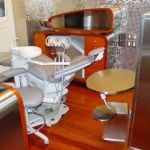Dental Care Tips for Elderly Patients with Dentures
- 1. Importance of Dental Care for Elderly Patients with Dentures
- 2. How to Maintain Dentures Properly
- 3. Common Dental Issues and How to Avoid Them
- 4. Real-Life Experience with Dentures
- 5. Choosing the Right Denture Care Products
- 6. Why Choose Dentistry Toothtruth for Your Denture Care Needs
1. Importance of Dental Care for Elderly Patients with Dentures
As we age, our dental health requires more attention, especially when it comes to dentures. Elderly patients with dentures need to be extra mindful of their oral hygiene to avoid problems like gum disease, oral infections, and the deterioration of the dentures themselves. Proper dental care can help maintain the fit, comfort, and function of dentures while promoting overall oral health.
It’s essential for elderly patients to establish a dental care routine that involves not just cleaning the dentures, but also maintaining the health of the gums and oral tissues. Poor dental hygiene in seniors can lead to complications, so it’s important to follow these tips to keep both the dentures and gums in optimal condition.
2. How to Maintain Dentures Properly
Maintaining dentures properly is key to ensuring they last and remain comfortable. Here are the essential steps to follow:
- Clean Your Dentures Daily: Just like natural teeth, dentures need to be cleaned regularly. Use a soft-bristled brush and denture cleaner to remove food particles and plaque. Avoid using toothpaste as it can be abrasive and damage the dentures.
- Soak Dentures Overnight: Dentures should be soaked in a cleaning solution or water overnight. This helps keep the dentures moist and maintains their shape. Never leave dentures out to dry as they may warp or crack.
- Rinse After Eating: After meals, rinse dentures to remove food debris. It’s also a good practice to rinse your mouth and brush your gums and tongue to maintain oral hygiene.
- Visit Your Dentist Regularly: Even though dentures are not subject to cavities, regular dental checkups are crucial for ensuring the dentures fit well and your gums remain healthy. Your dentist can make adjustments if needed.
3. Common Dental Issues and How to Avoid Them
While dentures can significantly improve the quality of life for elderly patients, improper care can lead to some common dental issues. Here are a few potential problems and how to avoid them:
- Gum Infections: If dentures do not fit properly or are not cleaned regularly, gum infections can develop. To avoid this, ensure that dentures are cleaned daily and fitted properly by your dentist.
- Denture Staining: Like natural teeth, dentures can stain over time. Avoid consuming foods and drinks that cause staining, such as coffee, tea, or red wine, and clean dentures regularly to prevent buildup.
- Loose or Ill-Fitting Dentures: Over time, dentures can become loose as the shape of the gums changes. If dentures begin to feel loose or uncomfortable, visit your dentist for an adjustment or new dentures.
- Bad Breath (Halitosis): Poor denture hygiene can lead to bad breath. Maintaining proper cleaning habits and brushing your gums, tongue, and palate daily will help prevent halitosis.
4. Real-Life Experience with Dentures
Many elderly patients find the transition to dentures a bit challenging at first. Take, for instance, the experience of Mr. Thompson, who, after receiving his dentures at the age of 65, struggled with discomfort and irritation during the first few weeks. However, with proper care—cleaning his dentures daily, soaking them overnight, and visiting his dentist regularly for adjustments—he was able to get used to his new smile and maintain excellent oral health.
Mr. Thompson’s story illustrates how, with the right care and regular dental visits, it’s possible to enjoy the benefits of dentures and avoid many of the common problems associated with them.
5. Choosing the Right Denture Care Products
To properly care for dentures, choosing the right products is essential. Here are some key products to consider:
- Denture Cleaners: Use denture cleaning tablets or solutions specifically designed for dentures. These products effectively remove plaque and stains without damaging the dentures.
- Soft-Bristled Brush: A soft-bristled brush is ideal for cleaning dentures, as it’s gentle on the material but still effective at removing debris.
- Denture Adhesive: If your dentures feel loose, denture adhesives can help improve their stability and comfort. However, always ensure they’re applied as directed to avoid gum irritation.
- Saline Solution or Water: Soaking dentures in water or a saline solution helps prevent them from drying out and warping. Avoid soaking them in hot water as this can damage the dentures.
6. Why Choose Dentistry Toothtruth for Your Denture Care Needs
At Dentistry Toothtruth, we specialize in providing comprehensive dental care, including personalized advice for elderly patients with dentures. We understand the challenges that come with maintaining dentures and are committed to helping our patients achieve optimal oral health.
If you are looking for expert guidance on caring for your dentures or need assistance with denture adjustments or replacements, visit Dentistry Toothtruth to learn more about our services and how we can help you maintain a healthy smile for years to come.







 First Class Dental PA5.0 (248 review)
First Class Dental PA5.0 (248 review) Kathleen Schultz, DMD0.0 (0 review)
Kathleen Schultz, DMD0.0 (0 review) Dr. Jeffrey R. Shapiro - iSmile5.0 (324 review)
Dr. Jeffrey R. Shapiro - iSmile5.0 (324 review) Gasser Dental Implants4.0 (219 review)
Gasser Dental Implants4.0 (219 review) Open Door Family Medical Center- Sleepy Hollow4.0 (215 review)
Open Door Family Medical Center- Sleepy Hollow4.0 (215 review) Generation Family Dental. (Dr. Kailing S. Wu, DDS)4.0 (19 review)
Generation Family Dental. (Dr. Kailing S. Wu, DDS)4.0 (19 review) The Importance of Oral Health Education During Pregnancy for a Healthy Pregnancy
The Importance of Oral Health Education During Pregnancy for a Healthy Pregnancy Best Tips for Brushing Your Teeth Properly for Healthy Gums: Essential Techniques for Oral Health
Best Tips for Brushing Your Teeth Properly for Healthy Gums: Essential Techniques for Oral Health Why Skipping Dental Checkups Can Lead to Bigger Oral Health Problems
Why Skipping Dental Checkups Can Lead to Bigger Oral Health Problems Advantages of Porcelain Dental Restorations
Advantages of Porcelain Dental Restorations How Can Diabetes Cause Tooth and Gum Problems? Preventing and Managing Oral Health Issues
How Can Diabetes Cause Tooth and Gum Problems? Preventing and Managing Oral Health Issues Healthy Habits for Promoting Good Oral Health and Hygiene: Tips for a Healthy Smile
Healthy Habits for Promoting Good Oral Health and Hygiene: Tips for a Healthy Smile